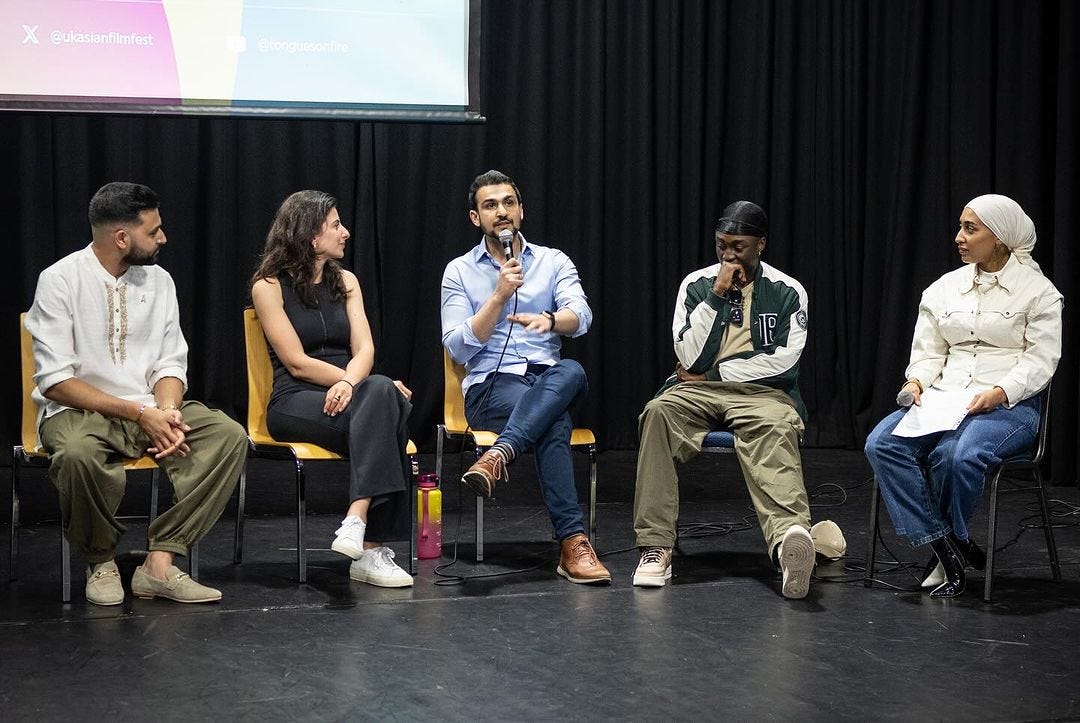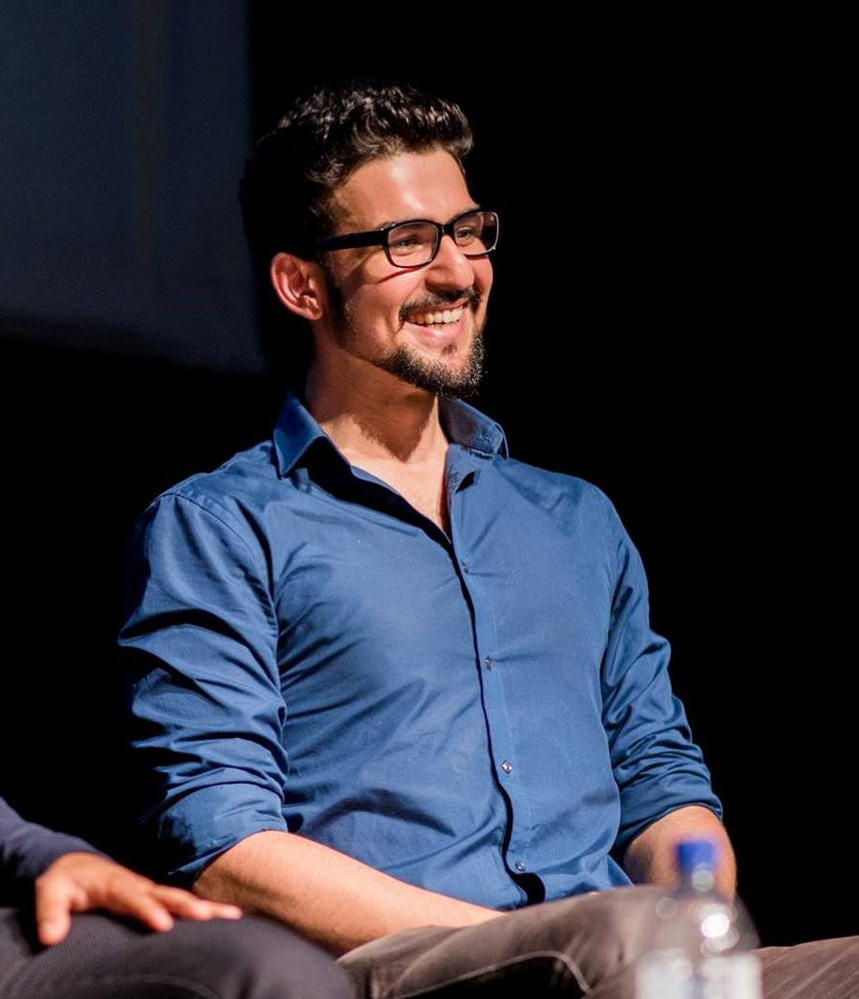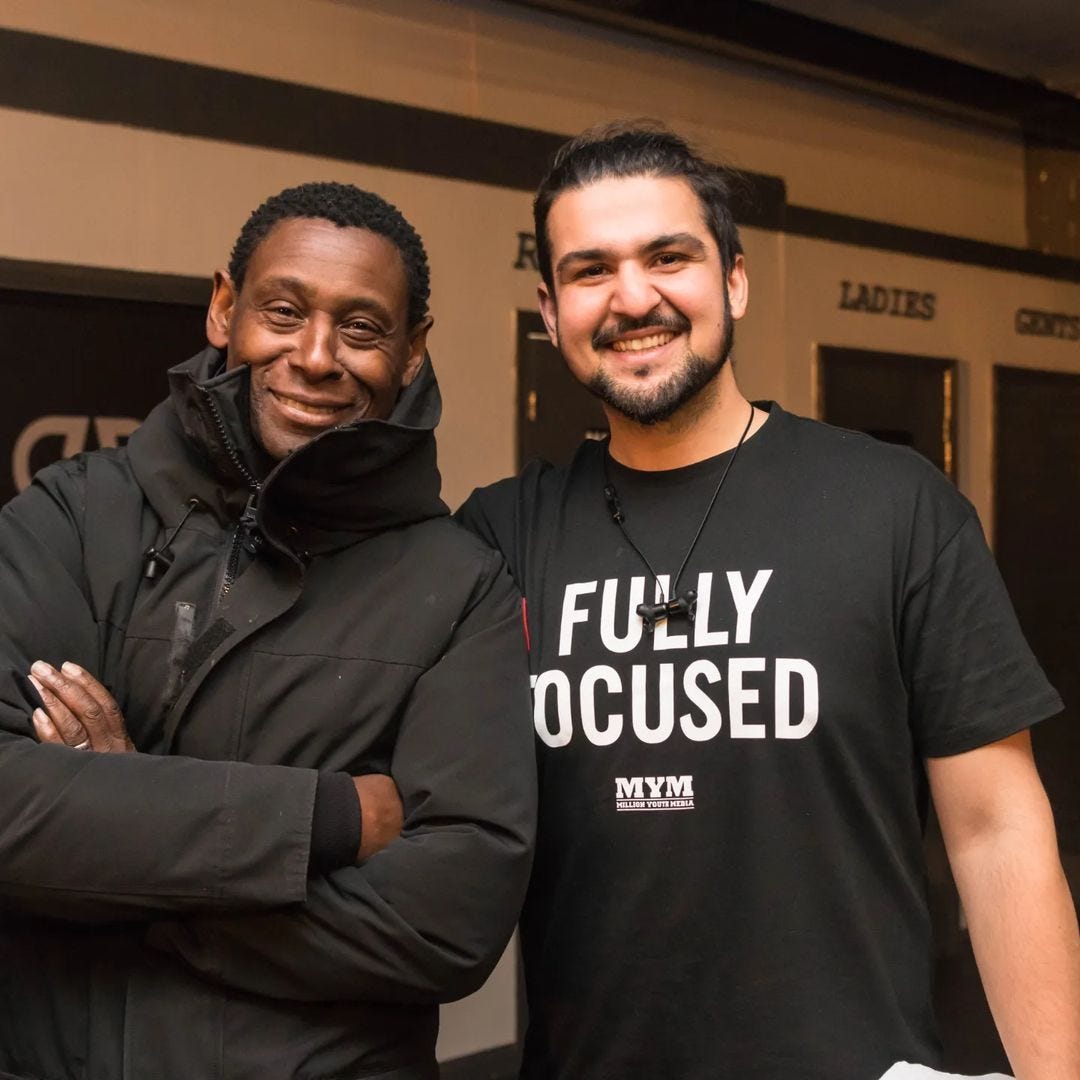Broadcasting: Shehroze Khan
Writer & Director Shehroze Khan opens up about horizontal hostility within the industry, his reluctance to introduce himself as a Muslim filmmaker, and the problem with tokenistic representation.
Woolly hats and anoraks in August, panic runs across the city, existential crises at 1am when you realise you’ve got to do it all again the next day; I am, of course, talking about the Edinburgh Fringe Festival. A place where everyone is desperate to tell you how it ‘feels like I’ve been here for an eternity but I only got here this morning!’ whilst glancing over your shoulder to see if there’s someone more interesting to part-complain, part-brag to.
I’ve been to the Fringe a few times now, once as a performer, once as a support to my performer friends (trust me, they need all the support they can get) and three times as an ‘industry professional’. But this year was the first time I noticed myself experiencing and exhibiting something my wise friend Alya told me about: horizontal hostility. Horizontal hostility is when you, as a member of a minority group, feel hostility towards members of a similar minority group. It happened to me whilst watching a fellow North African comedian. Rather than feeling an affinity with them, I judged them harsher than I would judge anybody else. I felt irritated, like they somehow hadn’t represented me in the way they should have. It’s something I hope to write about in much more detail, but the reason I’m bringing it up now is because I discuss it with this week’s guest, writer & director Shehroze Khan.
Recently named a Broadcast Hot Shot, Shehroze has worked with directors including Clio Barnard on Ali & Ava (BBC Films) and The Essex Serpent (Apple TV+) and Tessa Hoffe on Gangs of London S3 (Sky/AMC). His recent BAFTA and BIFA qualifying short film Man To Man starred David Harewood OBE, and Shehroze has directed numerous shorts with youth-led production company Fully Focused Productions. On top of all that, Shehroze is incredibly articulate. We talk about creativity, being pigeon-holed as a certain type of storyteller and the importance of supporting minorities within the industry.
“I think people rarely actually want diverse voices to be heard; they want their own voice, but through a body that - to them - represents diversity.”
In the creative industry, identity is often conflated with job title; it’s rare that an actor, director or writer is described without a series of words coming before their name that denote their ethnicity or religion. How much is your identity intertwined with being a writer and director?
In my normal life, outside of work, I identify as a Muslim. I would say I’m a British-Pakistani Muslim, not in terms of ethnicity but because Britain is where I live. But professionally, I would never say I am a Muslim filmmaker. That isn’t because I’m not proud of being Muslim, but because the moment I say I am a Muslim filmmaker, there are a set of assumptions made about the kind of stories I want to tell. A lot of my work has nothing to do with Islam, but in one my films there’s a scene where two characters are having a conversation about religion. I was speaking about it to a producer and they said, ‘wow, so you’re really into religious stuff then’. It was weird because that’s not what the film is about at all! It made me recognise that the labels we give ourselves can hold a totally different meaning for someone else.
Is being misperceived something you’ve always been aware of?
I think I’ve always had an ingrained awareness that people make certain judgements about me based on my name or the colour of my skin, and that the way I introduce myself only compounds that. I’ve moved around a lot, so I’ve seen how that perception changes based on where I am and who I’m speaking to. I was born in London to Pakistani parents, moved to Abu Dhabi when I was six, and then back to London when I was a teenager. I think I always had this belief that people from similar backgrounds to me just didn’t exist in the film industry. I remember making short films with my friends when we were really young, back in the days of floppy discs, and whenever I was coming up with characters’ names they’d always be called James or Richard or Michael. The idea of calling a character something like Shehroze felt uncinematic, unprofessional in a way. I wanted to feel professional.
When did you make your first film?
I was eight years old when I discovered Microsoft Paint and Windows Movie Maker. My friends and I would create these images and make them move in Windows Movie Maker. We felt like we’d invented animation! We’d use our web microphones to record voiceovers and then add music tracks. One was a spoof of The Matrix. Troy had just come out and we called it Troy Enter The Matrix. It was the characters from Troy but they had Matrix-like powers. I was pretty shy as a kid, so making films felt like a way of expressing myself.
I wanted to go to film school, but my family didn’t have any connections to the industry - they’d never known anyone who’d gone down this pathway and so they thought it was a crazy dream. They encouraged (really encouraged!) me to get a traditional degree, and so I went to university to study Maths. I’d always enjoyed it at school and I had this idea that studying Maths at university would somehow be more philosophical. I thought it’d be about discovering the beauty of the universe. Instead it was just like an extension of school! I really struggled to be honest and became disillusioned quite quickly. My mental health took a toll and along with that came a total lack of creativity. I’d gone from making films all the time with my friends to basically making nothing. Creativity is so influenced by what’s happening around you. Some days I feel like Shakespeare and the next I can’t write a single word.
Do you think you need to think creatively to be a director?
I think creativity is such a difficult thing to define; it’s mystical and mysterious and elusive. But I think that as a director you do have to have a strong creative vision. Everything else is about bringing out the best of the team that you are working with. I think the best directors have a really clear overarching creative vision. I love Richard Linklater - his films feel so distinctive. They feel like real life, but not in a miserable, de-saturated way. There is joy and heartbreak in his work. I love David Fincher. There’s a brilliant director called Aniel Karia who made an excellent feature called Surge, and I think Aleem Khan did a great job with After Love.
What I’d really love to see is this generation’s answer to Gurindher Chadha. When I was working on Ali and Ava, I was talking to one of the actors about the fact that Bend It Like Beckham came out over twenty years ago, and how there should be a whole generation of brown filmmakers absolutely killing it, but there’s not. It’s the same with TV shows. Goodness Gracious Me was empowering for a lot of Asians when it first came out in that it was smart and funny, but for the first time we weren’t the butt of the joke. Two decades later, whilst there might be more on-screen diversity, I haven’t seen many shows that have been as forward in their thinking or execution. And when you consider that Goodness Gracious Me first aired on TV in 1998, I don’t think we’ve come as far as we should have since then.
Why do you think progress has been so slow?
I was having this conversation with a friend recently and we were talking about this push for ‘diverse’ voices within the industry. But the truth is, I think people rarely actually want diverse voices to be heard; they want their own voice, but through a body that - to them - represents diversity. Whenever I pitch ideas, I feel like I am being moulded into what someone else thinks I should be, or encouraged to tell a certain kind of story.
It also comes down to what we were talking about earlier - the preconceptions people have about the kind of stories I want to explore. Sometimes I’m made to feel responsible for representing the ‘British Asian Muslim experience’. As if that experience is the same for every single one of us! It’s nonsensical; it’s like saying to a white writer that they should represent the white British experience. If Muslim characters feature in my work, I’ve had production companies say that, ‘unfortunately, we already have something with characters from this background on the slate’. As if all Muslim people, regardless of the world or story they exist in, are the same.

I can’t help but feel like this is an issue that derives from the fact that there isn’t enough diversity in commissioning or within production companies. So there is no-one to call out or even recognise that ignorance and narrow-mindedness you’re speaking about. Has that been your experience?
There have been multiple times where I’ve been on set and - because there is a character in the show who is from a similar religious or ethnic background to me - I’ll be consulted on a cultural aspect. Sometimes it’ll be the most basic thing, like ‘would a woman wear a hijab in the bedroom with her husband?’ I always wonder, if I didn’t happen to be there, who would they ask? Those questions also signify how surface-level diversity can be within our industry. What if there was someone on set who looked like me but had no connection to my culture or religion - would they be expected to offer the same level of understanding? Not all brown people are the same. That’s the problem with tokenistic representation. If you look a certain way, you’re expected and trusted to tell certain stories, regardless of how much engagement you actually have with those experiences. And then when those people make it to the top, instead of opening the doors for the rest of us, they slam them shut!
Do you think that’s because the industry is so competitive, or do you think it runs deeper than that?
I think part of it is that these people think they hold some kind of monopoly over Asian or Muslim stories, largely because the industry makes them feel like they do. I also think the stakes are higher for us; if a TV show with an all-Asian cast fails, it’s so much worse than when that happens with an all-white cast, because it feels like a precious opportunity that has been wasted. So I think that people from backgrounds similar to mine within the industry are often the most disempowering, which is strange to me. I had a project about two Muslim characters who are in a relationship but have chosen not to make that relationship physical until their wedding night. It’s exactly what I did and what a lot of people I know did. I pitched it to a producer who comes from a similar background to me and I was told that it was totally unrealistic, that there was no chance these characters wouldn’t have at least kissed. That’s very confusing as a writer; to be told that your lived experience is unrealistic.
What is the solution? How can we make sure that we’re empowering people rather than silencing them?
I think talking about and sharing our experiences with others who have also struggled helps. I shadowed this incredible director called Tessa Hoffe on the most recent series of Gangs of London. She was so open with me about her struggles as a female director, that it made me feel empowered to be more myself. There was a really special moment during Gangs where - in the production office - someone started speaking about Gaza. They were nervous - it was like they were testing the waters. I responded. Soon, everyone around the table was sharing their feelings and experiences, regardless of their background or ethnicity. It was incredibly cathartic. These conversations feel like the kind of thing you ‘don’t bring to work’. Our industry is one in which people have always been so expressive with their clothing and appearance, yet I felt afraid to wear my keffiyeh on set.
In terms of empowering these narratives on screen, I think it’s about disguising what you’re trying to say. When something is overt, people switch off and get defensive. Whereas genre has more appeal. If you think you’re going to watch a horror or a fantasy film, but it actually tricks you to trick you into having conversations about race along the way, that is powerful. I think it’s about giving people a pill they can swallow.






love this as always! and the cute little shoutout too xx